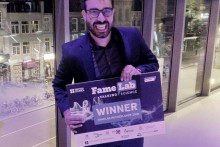Can you tell us more about your winning talk?
Santanna: ‘The goal of FameLab is to explain a scientific topic to the general public in an understandable way, so I decided to explain DDoS attacks by comparing them to King’s Day. Imagine that you are in Amsterdam on King’s Day and you need to catch a train that leaves in ten minutes. But you know you can’t make it, because there are so many people blocking the way. Which is basically what happens during a DDoS attack: they overload the network. There is an easy solution for you to catch the train. You could ask God to remove everyone dressed in orange, because those are the people in your way. In case of DDoS attacks, you could ask the “Gods” – the internet providers – to remove everyone blocking the service, because they can recognize them, almost as if they were wearing orange. See. A difficult topic, but an easy explanation.’
jAIR sANTANNA AT FameLab
FameLab is one of the world’s main science communication competitions. It challenges scientists to communicate their field of expertise in an accessible way to non-scientific audiences – and within three minutes.
After winning the UT round, Jair Santanna also managed to secure victory in the Dutch finals of FameLab held on the 9th of May at TivoliVredenburg. Santanna is an Assistant Professor at the chair of Design and Analysis of Communication Systems (DACS). He specializes in Cyber Security and DDoS attacks, which were the main topic of his FameLab presentation.
Why do you think it’s so important to be able to communicate science?
‘There are so many great research projects, but we as scientists are not trained to speak. We are trained to do research and write papers. But if we have better communication skills, we can make the society greater, because people will actually use our solutions if they can understand them – I collaborate with internet providers, banks, the Dutch cyber police and other organizations. I really love to present and I’m blessed to be able to do it well, but we should invest more in communication skills of our scientists.’
'People will use our solutions if they can understand them'
You said you feel ‘blessed’. Does presenting come naturally to you or did you undergo any training?
‘It’s all about practice. Everyone can do it, you just need to practice, improve, practice, improve … and practice. I started teaching religion at my community in Brazil when I was thirteen. I loved it and I’ve been talking in front of people ever since. I believe everyone can do it!’
You qualified for the international finals of FameLab, where you will compete against scientists from 26 countries. Will you talk about DDoS attacks again?
‘Yes, definitely, but I’m thinking about how to best approach the audience. You always have to think about the audience and how to relate to them. I’m considering comparing the topic to Brexit or something else people are familiar with. There is one scary thing about the finals, though. They take place during the week of my wedding. So I’m sure I can compete in the international semifinals, but not certain I can be at the finals if I qualify. That is a bit stressful.’







